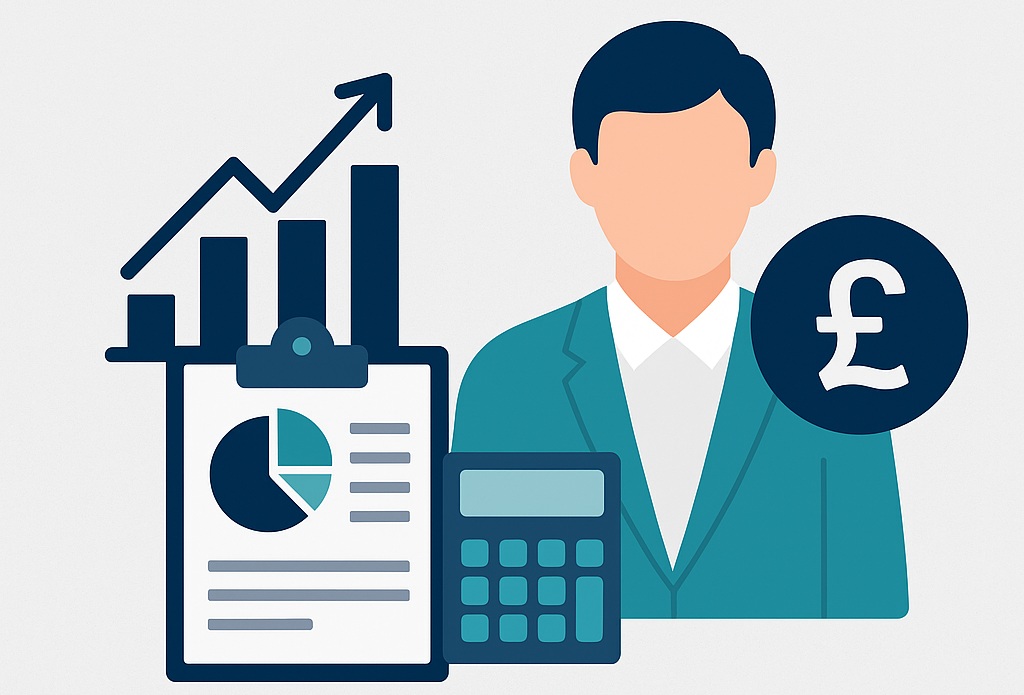Managing financial affairs effectively is the lifeblood of small companies. Keeping abreast of those finances is crucial, not only for making sure you meet your compliance obligations but also to guide decision-making and planning. It’s difficult, if not impossible, to make informed decisions about the future direction of your company if you don’t have all the financial facts at hand.
The accounting requirements of small companies are less onerous than those of larger ones but it’s important to get them right. Errors can be costly, and poor accounting practices can impact negatively on the business. Using a professional accountant can make a huge difference; simplifying the process, ensuring the accuracy of your financial information, and freeing you to focus on other aspects of your business.
What are a company’s accounts?
A company’s accounts are a summary of the financial activity of that company over a twelve-month period.
They should be prepared for HM Revenue & Customs and Companies House every year, and consist of financial information shown in the balance sheet, a profit and loss statement, and a cash-flow statement.
Additionally, depending on the size of the company, supporting notes about the account, a director’s report and an auditor’s report will also need to be included.
The balance sheet
The balance sheet gives a snapshot of the business’s assets, its liabilities, and any shareholders’ equity at a specific point in time.
It gives an indication of the overall financial health of the company when the accounts were prepared, and provides an easy-to-understand comparison of what is owned against what is owed.
An asset may be fixed, such as land or vehicles that have been owned by your company for a while.
Current assets are things that have a shorter lifespan, such as petty cash, stock items and cash in the bank.
A liability is a financial obligation that will need to be repaid. A long-term liability is a debt that will not become due within the next year, and a current liability will need to be repaid within a year.
This information gives an illustration of how money has been spent.
Profit and loss statement
The profit and loss statement records the performance of your property over a period, rather than a snapshot.
It includes details of the total revenue, and total expenses, of the business during the financial year.
The cash-flow statement
Cash flow is the amount of money that comes into, and goes out of, a business.
It follows then that a cash-flow statement explains the cash movements in and out of the business during the financial year.
This is different from the profit and loss statement because profit is recorded when a sale is made, while cash flow is recorded when the money is received.
Supporting notes
Notes to the accounts are any further information provided to support what is included in the accounts.
Some notes are a legal requirement, or may be stipulated by the accounting principles that are being followed.
Other notes can provide context for a company’s financial position, perhaps by offering details about specific entries in the balance sheet and the profit and loss account, or to back up future performance estimates.
Directors’ report
A directors’ report summarises the performance and current financial position of a company.
It is prepared by the board of directors, and provides context about the accounts, as well as proposed strategies for the business.
Auditor’s report
An auditor’s report is prepared by an external qualified auditor or chartered accountant.
It provides an independent evaluation of the truth and fairness of the company’s annual accounts.
What are small company accounts?
Small company accounts are the abridged form of company accounts that need to be filed with Companies House for a small company to meet its regulatory requirements.
Failure to do so can result in a range of penalties, and may even result in criminal action.
All limited companies are required to complete and file statutory accounts.
Statutory accounts for limited companies will include:
The balance sheet
This will detail the value of everything that the company owns, what it owes, and how much it is owed.
The profit and loss account
This highlight’s the company’s sales and its running costs, as well as any profit or loss that has been made over the course of the financial year.
Notes about the accounts offering extra details and any necessary explanations about the accounts.
Larger companies will usually be required to include both a director’s report and an auditor’s report.
If your company meets the criteria for being a small company or a micro-entity, then you may be able to file Abbreviated Accounts.
These include:
- A balance sheet signed by the director.
- Reduced notes.
For micro-entities, the requirements are even simpler. They will usually only need to send a balance sheet to Companies House in order to meet their minimum statutory requirements.
Statutory accounts for limited companies, whatever their size, will usually need to meet accounting standards.
These are either the International Financial Reporting Standards or New UK Generally Accepted Accounting Practice.
What qualifies as a small company in the UK?
The reporting requirements for small companies are less demanding when compared to those of larger companies.
There are, therefore, some advantages if a company is regarded as a small company according to the legislation.
The Companies Act 2006, sections 382 and 465, sets out what is a small company for accounting requirements.
A company will be regarded as small if it can meet two of the following criteria:
Your company will be ‘small’ if it has any two of the following:
- A company turnover of £10.2 million or less.
- A total of £5.1 million or less on its balance sheet.
- 50 employees or fewer.
If your company meets two of the above criteria, then it will qualify as a small company and will have a different set of requirements from Companies House.
The thresholds for what qualifies as a small company can change, particularly with regards to turnover, and your small business accountant can advise you about any changes that could impact your business.
Is 500 employees considered a small business?
Different organisations take different measurements to classify a small business.
In most cases, those with 500 employees would be considered larger than a small business.
The UK government’s definition of a small business is still based on the EU formulation, which states that to qualify as a small business the company should have 50 or fewer employees and a turnover not exceeding £10 million.
This is reflected in the Companies House criteria for a small company.
Companies House states that a company should have 50 employees or fewer for it to be regarded as a small company. However, it’s important to remember that a small company only needs to meet two out of the three criteria above to be considered a small company by Companies House.
Theoretically, a company could employ considerably more than 50 people, while having a turnover of £10.2 million or less, and £5.1 million or less on its balance sheet. In practice, however, more employees will usually mean a higher turnover and a higher figure on the balance sheet.
Do small company accounts need to be audited?
By law, all UK companies require an audit.
There are, however, some exceptions to these requirements.
Small, stand-alone companies that qualify as such under the 2006 Companies Act (as set out above), will usually be exempt from the audit requirement.
If companies are part of a larger group, then this exemption may not apply.
Subsidiary companies in a larger group may be exempt from the audit requirement if they meet certain criteria , and if the parent company provides a guarantee of all outstanding liabilities at the end of the financial year.
The rules regarding subsidiaries are complex, and if you have any doubt about the status of your own company you should consult your accountant.
Can I prepare small company accounts?
In theory, there’s nothing to prevent anyone from preparing their own small company accounts.
However, nearly every limited company in the UK will use a professional accountant to prepare their accounts and there are several reasons why this is the preferred option.
First, it makes life easier.
Most people running small companies don’t have the time to devote to preparing their accounts with the due care and attention necessary.
It’s better to assign the task to someone who can take an efficient approach to your regulatory requirements, as well as an overarching look at the overall financial state of your company.
An accountant will understand any changes to the regulatory requirements.
Finding an accountant that understands the particular requirements of small companies and micro-entities can make all the difference.
They not only ensure you are meeting all of your statutory requirements, but can be a source of advice, providing a perspective based on your company’s financial performance.
How Venn Accounts can help
At Venn Accounts, we understand that completing your annual accounts is about more than merely going through the motions.
Our specialist Statutory Accounts and Micro-Entity Accounts services provide a thorough accounting and support service for small companies.
Not only do we make sure that your small company accounts can stand up to scrutiny, we also make sure that you’re on track to meet your goals and objectives.
We do this by developing a broad understanding and insight into your business, performing a full review of your bookkeeping.
We match your accounts with the most appropriate regulatory format, collating all the required information.
We then get you to check the information again before it’s signed off. Once that’s done, we submit the accounts to Companies House on your behalf.
Here at Venn Accounts we are committed to ensuring all our clients understand clearly what we can do for them, while fully supporting them every step of the way.
Our flexible, bespoke and cloud-based services are ideally suited to the requirements of small companies.
To find out more about how Venn Accounts can help your business meet its statutory obligations and achieve its goals and obligations, call 020 80 882 590 or email enquiries@vennaccounts.com to find out more. We are here to help and are happy to answer any questions you might have.





